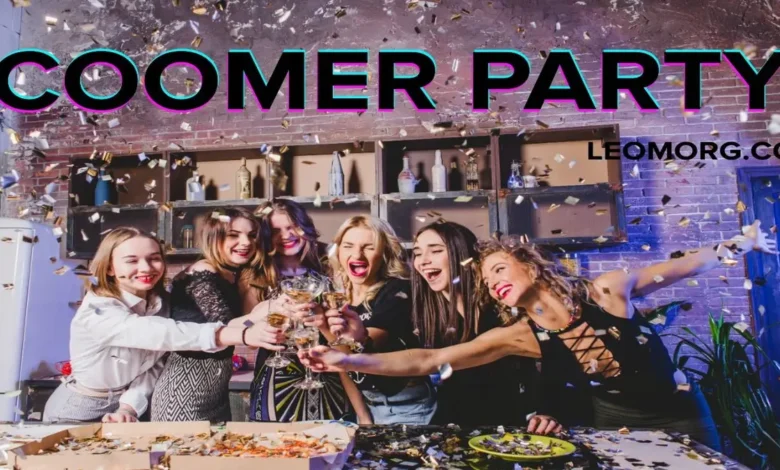Coomer Party: How Meme Culture Shaped This Viral Trend

Introduction
The internet has given birth to countless viral trends, but few have been as bizarre and controversial as the “Coomer Party.” Emerging from the depths of meme culture, this phenomenon blends shock humor, absurdity, and social commentary in a way that only online communities can. But what exactly is a Coomer Party, and how did it become a viral sensation?
In this deep dive, we’ll explore:
- The origins of the Coomer meme and its transformation into a “party” concept
- The role of 4chan, Reddit, and TikTok in spreading the trend
- Why shock humor and irony dominate modern meme culture
- The psychological and social factors behind its virality
- The controversies and criticisms surrounding the Coomer Party
By the end, you’ll understand how a seemingly nonsensical meme evolved into a full-blown internet movement.
Chapter 1: The Origins of the Coomer Meme
What is a “Coomer”?

Before there was a Coomer Party, there was the “Coomer”—a slang term originating from internet forums, particularly 4chan’s /r9k/ board. The word itself is a deliberate misspelling of “cum-er,” mocking men with excessive porn consumption or compulsive sexual habits.
The Coomer meme typically features:
- A grotesque, unkempt male caricature (often with exaggerated features like sunken eyes and a disheveled appearance)
- Self-deprecating humor about addiction to pornography, masturbation, or hedonism
- Satirical “advice” or “confessions” in a mock-serious tone
The Birth of the Coomer Wojak
The “Wojak” meme (a simple, sad-looking cartoon face) became the perfect vessel for the Coomer. Artists on 4chan and Reddit began creating variations, depicting the Coomer as a pathetic yet humorous figure—someone who prioritizes instant gratification over real-life fulfillment.
This meme resonated because it satirized real behaviors while remaining absurd enough to be shared ironically.
Chapter 2: From Meme to Movement—The Rise of the Coomer Party
How Did the Coomer Party Start?
The Coomer Party didn’t emerge overnight. It evolved from:
- Shitposting Culture – Online communities like 4chan and /r/okbuddyretard began using the Coomer as a symbol of degeneracy, turning it into a joke about wild, exaggerated gatherings.
- Irony and Escalation – Members took the absurdity further, imagining “Coomer Parties” as chaotic, hypersexualized events where people act out the worst stereotypes of internet addicts.
- TikTok and Viral Challenges – Short-form video platforms amplified the trend, with users roleplaying as Coomers or making skits about “attending” a Coomer Party.
Key Elements of a Coomer Party Meme
- Hyperbolic Imagery – Depictions of messy rooms, energy drinks, and excessive screen time
- Mock “Invitations” – Fake flyers or posts “announcing” a Coomer Party
- Satirical Rules – Jokes like “No showers allowed” or “Bring your lotion”
- Roleplaying – People pretending to be Coomers for comedic effect
Chapter 3: Why Did the Coomer Party Go Viral?
1. The Power of Shock Humor
Internet humor thrives on pushing boundaries, and the Coomer Party does this by exaggerating taboo topics (porn addiction, laziness, social isolation). The more absurd it gets, the more shareable it becomes.
2. Relatability (in an Ironic Way)
While most people don’t relate to being a Coomer, many recognize the broader themes:
- Wasting hours online
- Struggling with procrastination
- The absurdity of internet culture
By laughing at the extreme version, people cope with their habits.
3. Community and Inside Jokes
The Coomer Party became a shared language among meme enthusiasts. Posting about it signals that you’re “in the know” within online circles.
Chapter 4: Controversies and Criticisms
Is the Coomer Party Harmful?
While mostly satirical, some argue that the trend:
- Normalizes unhealthy behaviors (by making them seem funny rather than concerning)
- Promotes toxic stereotypes (e.g., mocking people with real addiction issues)
- Could be taken seriously by impressionable audiences
Defenders of the Meme
Others see it as harmless absurdism, arguing:
- It’s exaggerated and not meant to be taken literally
- It parodies real issues without glorifying them
- Most participants understand it’s a joke
Chapter 5: The Future of the Coomer Party Trend
Like all internet memes, the Coomer Party will likely fade—but its impact remains. It reflects broader themes in digital culture:
- The blur between irony and reality
- How niche jokes become mainstream
- The internet’s love for self-deprecating humor
New variations will emerge, but the Coomer Party will be remembered as a peak example of meme-driven absurdity.
Conclusion
The Coomer Party is more than just a meme—it’s a cultural artifact of internet humor. Born from 4chan’s shock-value roots and amplified by TikTok’s viral nature, it perfectly encapsulates how online communities turn irony into movements.
Whether you find it hilarious, concerning, or just bizarre, one thing is clear: meme culture has the power to shape trends in ways no one expects.
1. What is a Coomer Party, and is it a real event?
No, a Coomer Party is not a real gathering—it’s a satirical internet meme mocking extreme online behavior. The concept stems from the “Coomer” caricature, a joke about excessive pornography consumption and degenerate habits. The “party” is an exaggerated, fictional scenario where people humorously roleplay as Coomers.
2. Where did the Coomer Party meme originate?
The trend began on 4chan’s /r9k/ board and spread through Reddit, TikTok, and meme forums. It evolved from the “Coomer Wojak” meme, which depicted a disheveled, addicted internet user. Over time, the joke escalated into imaginary “parties” where absurd, hypersexualized stereotypes are played up for comedy.
3. Why did the Coomer Party go viral?
The meme spread due to:
- Shock humor (pushing taboos exaggeratedly)
- Relatability (joking about procrastination, screen addiction, and internet culture)
- Community engagement (inside jokes that unite online groups)
- Platforms like TikTok and Twitter/X amplified it through ironic skits and memes.
4. Is the Coomer Party offensive or harmful?
Opinions are divided:
- Critics argue it trivializes real addiction and mental health struggles.
- Supporters see it as harmless absurdist humor, not meant to be taken seriously.
- Most participants treat it as pure satire, but context matters—some may misuse the meme maliciously.
5. Will the Coomer Party trend last?
Like most internet memes, it will likely fade or morph into new formats. However, its themes—irony, degeneracy humor, and online self-deprecation—will persist in future viral trends. The Coomer Party is just one example of how meme culture recycles and exaggerates social behaviors for comedy.





